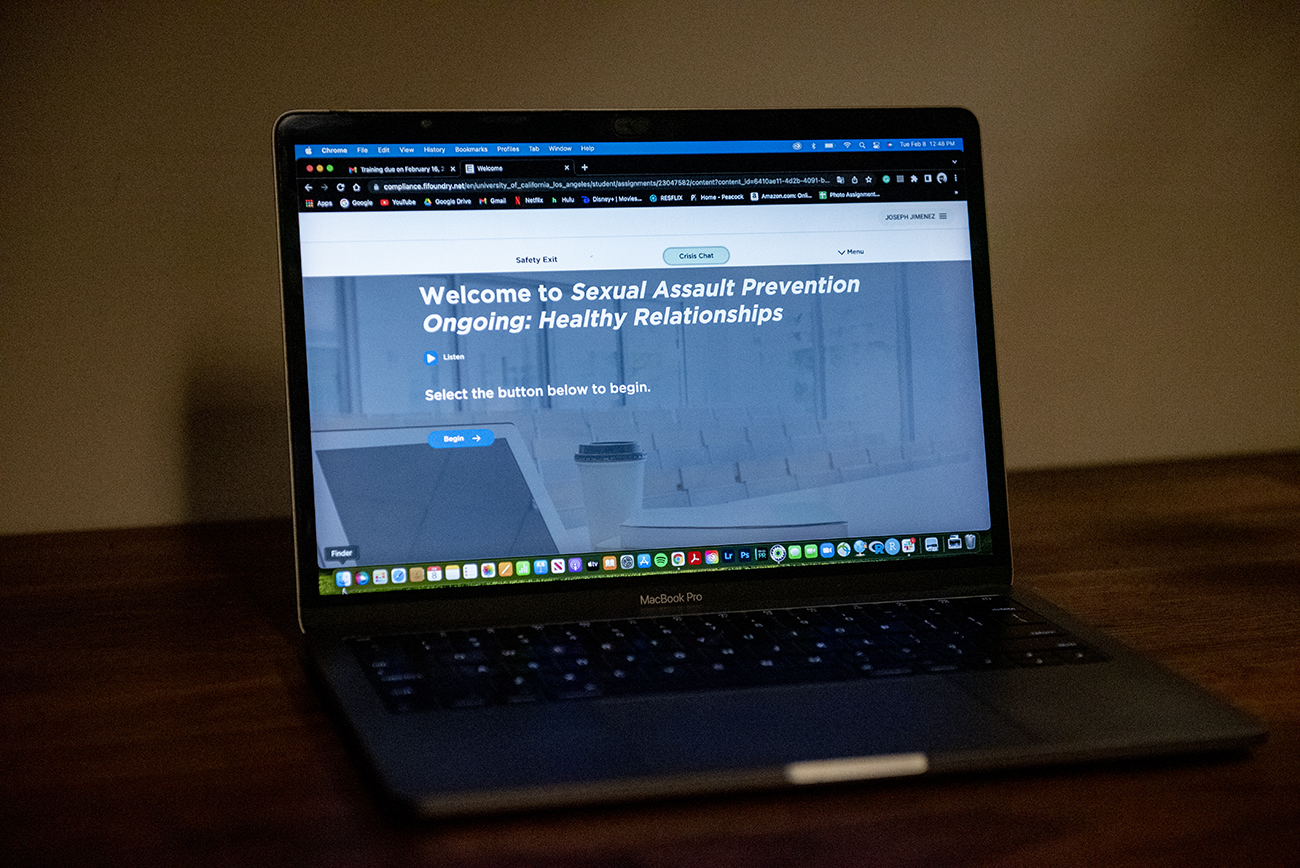Students voice concerns about efficacy of sexual assault prevention training

UCLA requires all students complete an online course called “Sexual Assault Prevention Ongoing: Healthy Relationships,” but some students are concerned the training will not be effective. (Joseph Jimenez/Daily Bruin)
By Kate Vedder
Feb. 8, 2022 6:15 p.m.
This post was updated Feb. 9 at 11:12 p.m.
Amid a rise in sexual assault allegations, some students said they feel uncertain about the effectiveness of UCLA’s recent mandatory sexual assault prevention training.
The university requires all students to complete an online course called “Sexual Assault Prevention Ongoing: Healthy Relationships” by Feb. 14, according to Title IX director Mohammed Cato in a campuswide email. Cato added that UCLA will put a registration hold on student accounts that have not finished the training, preventing enrollment in spring quarter classes.
UCLA will require the annual completion of the training for all students going forward, UCLA spokesperson Bill Kisliuk said in an emailed statement. The training is intended to spread awareness of sexual assault prevention by providing an additional educational program, Kisliuk added.
The training course includes six modules that cover topics such as harassment, bystander intervention and coercion, among other learning objectives.
However, Daniel Schettini, chief of finance for UCLA Sexperts – a student organization dedicated to educating the UCLA community about sexual health – said one shortfall of the mandated program is that many college students cannot relate to the scenarios presented in the training.
“My only concern is the fact that a lot of the scenarios inside the training itself and the verbiage that they use does not really relate to a lot of the campus,” Schettini said. “It’s not framed in the real world.”
Schettini said within the last few months, there has been an increase in the number of fraternities and sororities contacting Sexperts to request additional educational materials and workshops about interpersonal relationships.
The university developed the program in response to rising concerns from the UCLA community regarding the lack of prevention programs enforced for non-first-year students, Kisliuk said.
In an emailed statement, the UCLA Interfraternity Council said UCLA’s mandated training will help educate members about what constitutes sexual assault. IFC also said all new members are required to participate in a two-hour seminar about adhering to a set of high moral standards.
Kisliuk added that the required training is intended to help students maintain healthy relationships and provide support services to UCLA community members.
Sexperts and other campus organizations supplement university education with additional resources about interpersonal relationships and sexual health. In addition to those offered by Sexperts, other sexual health resources include UCLA Counseling and Psychological Services, the Arthur Ashe Student Health and Wellness Center and the UCLA LGBTQ Campus Resource Center, among other campus reporting and support options, according to the Student Wellness Commission.
Jordyn Fuchs, a first-year applied mathematics student, said the training helped redefine the concept of sexual assault for her, but she is uncertain of its broader efficacy.
“It was informational, but … you also have to consider how much people are actually paying attention to it,” Fuchs said. “I’m not sure how we can actually ensure that people are paying attention to it or learning from it, but I think that is a start.”
The training presents a detailed analysis of coercion and consent, according to the course outline.
However, the length caused Fuchs to feel disengaged.
Kati Rady-Pentek, a first-year molecular, cell and developmental biology student, added that even though the training was useful in classifying what constitutes sexual assault, she did not attentively read through the entirety of the course.
Schettini added that the university should continue its efforts to educate students on interpersonal relationships beyond the required training.
“Overall, this is a step in the right direction,” Schettini said. “We want to see action that is more pragmatic because this can’t be a one-and-done thing.”


